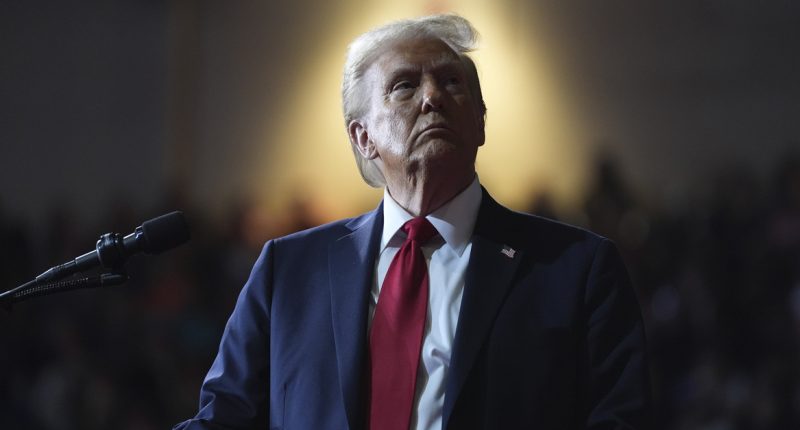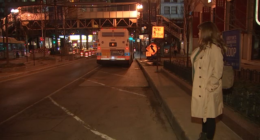Share this @internewscast.com
FILE — Republican presidential nominee, former President Donald Trump, observes a video screen during a campaign rally at the Salem Civic Center in Salem, Virginia, on Nov. 2, 2024. (AP Photo/Evan Vucci, File).
A California judge delivered another setback to the Trump administration’s immigration policies on Monday, preventing the deportation of a Venezuelan migrant under the Alien Enemies Act of 1798 (AEA), but with certain stipulations.
Darwin Antonio Arevalo Millan, a Venezuelan national detained at an Immigration and Customs Enforcement (ICE) facility in Adelanto, California, is permitted to stay in the U.S. after a ruling from U.S. District Judge John Holcomb, who found that Millan’s due process rights were violated. Although Holcomb, a Trump appointee, acknowledged this, he also stated that the attempt to deport Millan under the AEA—a legal provision from the 18th century last invoked during World War II for the internment of Japanese Americans—was not “unlawful” as argued by Arevalo’s attorneys in court documents.
In fact, Holcomb went as far as to declare the president’s “authority” under the AEA as being nearly “unlimited” in his order, citing a 1948 Supreme Court ruling in Ludecke v. Watkins, a case where the deportation of a German “alien enemy” was found to be constitutional under the AEA due to the president’s wartime power, which appears to be “as unlimited as the legislature could make it,” per the ruling.
“In short, the AEA’s grant of authority to the President is close to ‘unlimited,”” Holcomb argued, citing Ludecke v. Watkins.
“And it includes the ability to decide whether an invasion or predatory incursion has occurred,” he said. “As such, this court cannot construe those terms without constraining the president’s authority under the AEA,” the judge added.
Love true crime? Sign up for our newsletter, The Law&Crime Docket, to get the latest real-life crime stories delivered right to your inbox.
Holcomb concluded that although Arevalo, who filed a motion for a temporary restraining order to block his deportation, is unlikely to succeed on the merits of his claim that the use of the AEA is unlawful, he is likely to succeed on the merits of his due process claims. This is because of the government’s own omission that it must provide detainees “notice and process” before removing them under the AEA, according to Holcomb.
“Indeed, the Government … does not appear to disagree that Arevalo will succeed on his due process claims,” the judge said. “Instead, the Government argues that Arevalo has necessarily already received adequate notice and process because he filed a habeas petition.”
According to Holcomb, these arguments are “unavailing” and the court is “hard-pressed to conclude” that the filing somehow means Arevalo has already received adequate process and notice.
“Similarly, although the Government indicates that it will provide detainees with more than 24 hours’ notice of their removals … the Government refused to tell the Court how much notice it actually intends to provide,” he said.
More from Law&Crime: ‘Turned the constitutional structure upside down’: Trump admin asks SCOTUS to halt ‘indefensible’ court order and permit mass termination of federal workers
Arevalo’s lawsuit states he was allegedly arrested after he reported for an ICE check-in that he had scheduled. According to the lawsuit, Arevalo was arrested due to an alleged affiliation with the notorious Venezuelan gang Tren de Aragua (TdA), with his tattoos being used against him as proof, his lawyers say.
“His arrest was premised upon his status as a Venezuelan with tattoos, which, although allegedly basketball-related, could indicate that Arevalo is affiliated with Tren de Aragua,” Holcomb said.
His ruling comes as the Trump administration continues to deal with lawsuits and judicial decisions related to the president’s use of the AEA, along with allegations of civil rights violations and court mandates being ignored.
One of the most noteworthy cases surrounds a Maryland man and father named Kilmar Abrego Garcia, who was deported to El Salvador despite his protected status. His attorneys have accused the government of defying a federal judge and the U.S. Supreme Court by refusing to provide any information regarding what has been done to “facilitate” his return to the U.S. after he was shipped off in March.














